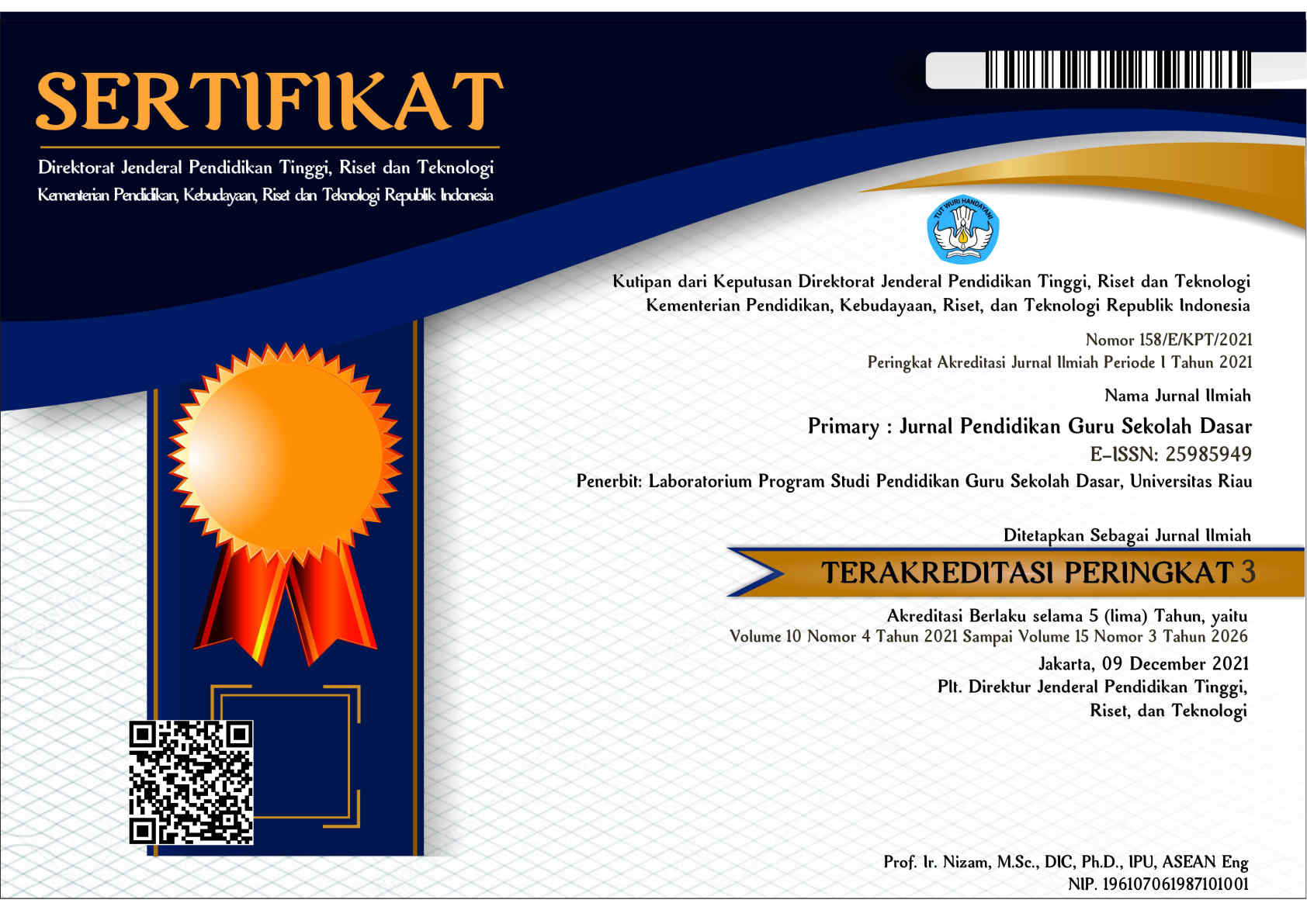THE INFLUENCE OF THE UNIFIED THEORY OF ACCEPTANCE AND USE OF TECHNOLOGY (UTAUT) MODEL ON THE APPLICATION OF INFORMATION AND COMMUNICATION TECHNOLOGY AT ELEMENTARY SCHOOLS
Abstract
This paper examines the effect of applying Information and Communication Technology (TIK) in the learning process through the UTAUT model. There are four components seen from the UTAUT model, namely Performance Improvement Expectations, Business Improvement Expectations, Social Influence, and Supporting Conditions. The population used in the research were teachers at three schools in Jambi, namely SDN 47/IV, SDN 66/IV, and SDIT Al Azhar. The sample in the research involved 130 teachers in the three schools. The research is quantitative research. Research data were obtained through survey methods and questionnaires. The data analysis used in the research is PLS-SEM. The results indicate that the four components of the UTAUT model had a significant influence on the use of Information and Communication Technology (TIK) applied by teachers in the learning process. The most influential component of UTAUT through Information and Communication Technology applied by teachers is the Supporting Conditions. Based on the results of the research, it can be concluded that the unified theory of acceptance and use of technology model has an influence on the use of Information and Communication Technology (TIK) applied by elementary school teachers in the learning process.
Keywords
Full Text:
PDFReferences
Aka, K. A. (2017). Utilization of Information and Communication Technology (ICT) as an Innovative Form of Learning Resources in Elementary Schools. ELSE (Elementary School Education Journal): Jurnal Pendidikan Dan Pembelajaran Sekolah Dasar, 1(2a).
Abdillah, L. A., et al., 2007. The effect of compensation and information technology on lecturer performance (KIDO) remains at Bina Darma University, Jurnal Ilmiah Matrik, vol. 9, pp. 1-20.
Batubara, D. S. (2018). SD/MI teacher information and communication technology competency (portrait, factors, and efforts to improve it). Muallimuna: Jurnal Madrasah Ibtidaiyah, 3(1), 48-65.
Bendi, R. K. J. B., & Andayani, S. (2013). Analysis of information system usage behavior using the UTAUT model. Semantik 2013, 3(1), 277-282.
Destaningrum, D., & Suprapto, N. H. W. (2018). Factor analysis of public high school e-learning user acceptance in the city of Blitar using the Unified Theory Of Acceptance And Use Of Technology (UTAUT) model. Jurnal Pengembangan Teknologi Informasi dan Ilmu Komputer e-ISSN, 2548, 964X.
Etikan, I., Musa, S. A., & Alkassim, R. S. (2016). Comparison of convenience sampling and purposive sampling. American journal of theoretical and applied statistics, 5(1), 1-4.
Gunasinghe, A., Hamid, J. A., & Azam, S. F. (2020). The viability of UTAUT-3 in understanding the lecturer’s acceptance and use of virtual learning environments. International Journal of Technology Enhanced Learning, 12(4), 485-481.
Hair, J. F., Hult, G. T. M., Ringle, C., & Sartedt, M. (2017). A primer on partial least squares structural equation modelling (PLS-SEM). Sage Publications.
Hair, J. F., Black, W. C., Babin, B. J., & Anderson, R. E. (2010). Multivariate data analysis: a global perception. Pearson, Upper saddle River, NJ.
Hair, J. F., & Hult, G. T. M. (2016). A primer on partial least square structural equation modeling (PLS-SEM). US: Sage Publication.
Handayani, T., & Sudiana, S. (2015). Analysis of the application of the UTAUT (Unified Theory of Acceptance and Use of Technology) model to information system user behavior (case study: academic information system at STTNAS Yogyakarta). Angkasa: Jurnal Ilmiah Bidang Teknologi, 7(2), 165-180.
Hossain, G. M. S., Islam, M. N., Hossesn, M. N., Rahman, M. S., Famanna, M. N., & Sarmin, J. F. (2020). Empirical study on the factors influenching technology acceptance decision to use of information system (IS) services in academic profession: Integration of UTAUT & EEM Model. International Journal of Recent Engineering Research and Development 5(1).
Hu, S., Laxman, K., & Lee, K. (2020). Exploring factors affecting academics adoption of emerging mobile technologies-an extended UTAUT perspective. Education and Information Technologies, 25(5), 4615-4635.
Kim, J., & Lee, K. S. S. (2020). Conceptual model to predict filipino teachers adoption of ICT-based instruction in class: using the UTAUT model. Asia Pacific Journal of Education.
Marchewka, J. T., & Kostiwa, K. (2017). An application of the UTAUT model for understanding student perceptions using course management software. Communications of the IIMA, 7(2), 10.
Milosevic, I., Zivkovic, D., Manasijevic, D., & Nikolic, D. (2015). The effects of the intended behaviour of students in the use of M-learning. Computers in Human Behavior,51, 207-215.
Mutiani, M., Supriatna, N., Abbas, E. W., Rini, T. P. W., & Subiyakto, B. (2021): Technological, pendagogical, content knowledge (TPACK): A discursions in learning innovation on social studies. The Innovation of Social Journal, 2(2), 135-142.
Noor, S. M., Rasoolimanesh, S. M., Jaafar, M., & Barghi, R. (2018). Inscription of a destination as a world heritage site and residents perceptions. Asia Pacific Journal of Tourism Reserch, 24, 1-17.
Shukla, S. (2020). M-learning adoption of management students : A case of India. Education and Information Technologies, 1-32.
Sofwan, M., Pratama, R., Muhaimin, M., Yusnaidar, Y., Mukminin, A., & Habibi, A. (2021). Contribution of technology innovation acceptance and organizational innovation climate on innovative teaching behavior with ICT in indonesian education. Qwerty-Open and Interdisciplinary Journal of Technology, Culture and Education, 16(1), 33-57.
Sofwan, M. (2021). Determinant Mapping Model of the Use of Information and Communication Technology in the Learning Process of Elementary Schools in Jambi City.
DOI: http://dx.doi.org/10.33578/jpfkip.v12i1.9544
Refbacks
- There are currently no refbacks.
Copyright (c) 2023 Silvia Kartika Ningsih

This work is licensed under a Creative Commons Attribution-NonCommercial-ShareAlike 4.0 International License.
____________________________________________________________
Primary: Jurnal Pendidikan Guru Sekolah Dasar
Secretariat
Program Studi Pendidikan Guru Sekolah Dasar
Gedung B1, FKIP Universitas Riau
Kampus Bina Widya Km. 12,5 Simpang Baru Panam
Pekanbaru Riau Indonesia 28293
e-mail : primary@ejournal.unri.ac.id



